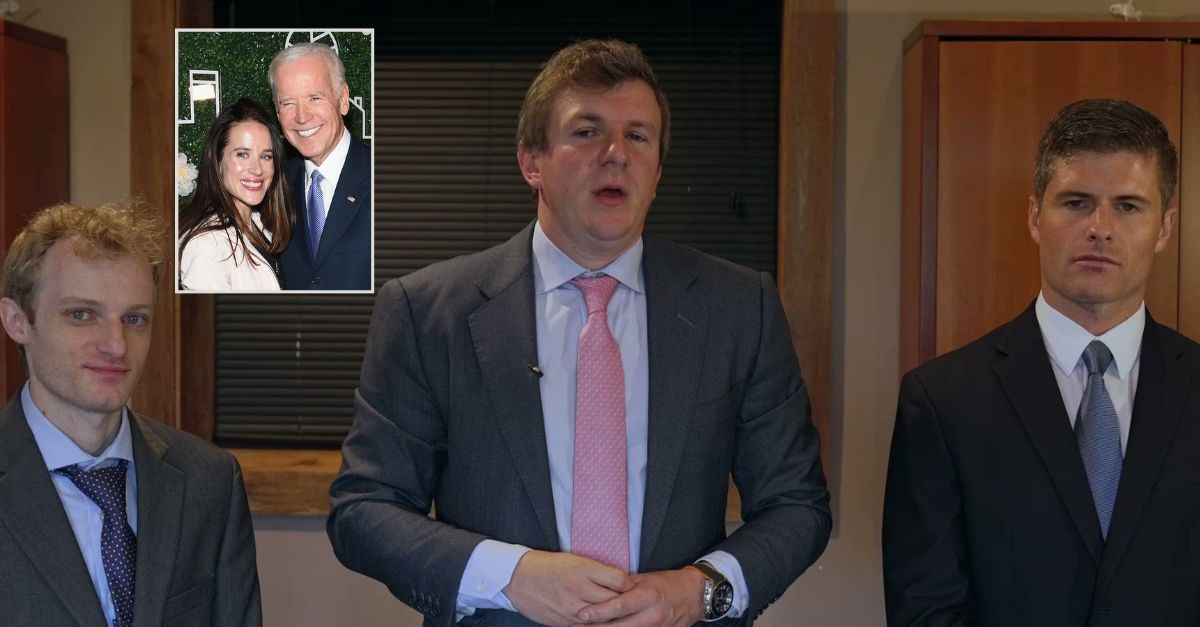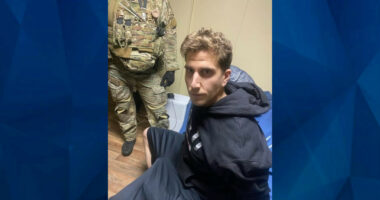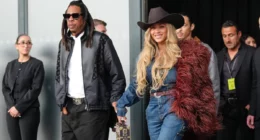
Left to right: Former Project Veritas staffer Eric Cochran, Project Veritas founder James O’Keefe, and former staffer Spencer Meads appear in video in September 2023. (O’Keefe Media Group/X). Inset: Ashley Biden and Joe Biden appear at a Feb. 7, 2017 event in New York City (Photo by Jamie McCarthy/Getty Images for GILT.)
The assertion of journalist-source privilege invoked by Spencer Meads, a former staffer for Project Veritas involved with the duo who pleaded guilty to stealing the diary of President Joe Biden’s daughter Ashley Biden, was rejected by the Second Circuit Court of Appeals on Tuesday.
The court simultaneously upheld the use of a crime-fraud exception previously placed over certain records tied to the theft.
Project Veritas is known for video sting operations of liberal targets and perceived enemies of former President Donald Trump.
Prior to Tuesday’s ruling, Project Veritas founder James O’Keefe and former fellow staffer Eric Cochran and Meads had appealed a district court order granting the government access to electronic devices located at their homes in connection with the diary theft, Law&Crime reported.
Aimee Harris and Robert Kurlander each pleaded guilty in August 2022 to conspiring to commit interstate transportation of stolen property and further, they admitted that they stole Ashley Biden’s diary before selling it to Project Veritas for $40,000. Harris has waylaid her sentencing at length and only recently was arrested on marijuana and open container charges.
When a special master was appointed to oversee review of the documents at issue in the case, a report from the special master followed that identified 943 documents specific to the warrants. None were protected by journalist’s privilege while just 24 were considered semi-protected under attorney-client privilege. Another 10 documents that would have been protected by attorney-client privilege in fact fell under the crime-fraud exception and needed to be disclosed.
Acknowledging the history of objections that the special master had failed to correctly recognize evidentiary privileges, the Second Circuit reaffirmed the district court’s ruling by laying out its interpretation of confidentiality rules for journalist privilege claims.
The journalist privilege can apply to confidential as well as nonconfidential information, the appeals panel noted on Tuesday, but where the protection of confidential sources are not involved, “the nature of the press interest protected by the privilege is narrower.”
Disclosure can be ordered “only upon a clear and specific showing that the information is: highly material and relevant, necessary or critical to the maintenance of the claim, and not obtainable from other available sources.”
When Harris and Kurlander found and then stole Ashley Biden’s diary, the Project Veritas journalists argued that the duo gave them the stolen property under the promise of confidentiality.
But the Second Circuit disagreed: When Harris and Kurlander pleaded guilty, they revealed that they were the ones who gave Project Veritas the stolen diary. Thus, the district court had correctly concluded that the government met its burden of showing the diary was not just relevant to the conduct involving Project Veritas staff that they were investigating but that the information also couldn’t likely be obtained from anywhere or anyone else but O’Keefe, Meads or Cochran.
Even if the court were to assume that Project Veritas originally received the nicked diary under a promise of confidentiality as they asserted, “matters disclosed in public lose their privileged status because they obviously are no longer confidential,” the court wrote Tuesday.
“‘The cat is let out of the bag, so to speak,’” the ruling continued, directly citing a 1987 case known as In re Von Bulow which held that a party had implicitly waived his attorney-client privilege when his attorney published privileged material in a book and then a client assisted in promoting the book.
Meads argued that the district court should have consulted the Supreme Court’s 2001 ruling in Bartnicki v. Voppper that the First Amendment protects the publication of information even if it was obtained unlawfully. But here too the Second Circuit disagreed with Meads’ interpretation, highlighting that the records in question were 1) subject to proper search warrants after a magistrate found probable cause related to a federal crime existed, 2) a district court agreed to appoint a special master and then 3) that special master assessed the documents accordingly.
Meads’ challenges on attorney-client privilege were also without merit. For example, nine documents sought by prosecutors and later reviewed by the special master contained no requests for legal advice and that included a letter sent to Project Veritas’s chief legal officer at the time. An email to the CLO alone did not imply attorney-client privilege, the Second Circuit ruling affirmed.
Communication discussing authentication of the stolen journal also did not qualify as legal advice and Meads had failed to identify any instance in those messages where legal advice was given or sought.
For 10 documents flagged under the crime-fraud exception to attorney-client privilege by the special master, the Second Circuit noted too that the lower court determined this correctly. Each one of these records indicated “an effort to conceal the criminal conspiracy or to create or present misleading or false evidence or otherwise served to further the conspiracy.”
Meads claimed on appeal this was wrong and contended that it had not been “established that (1) a crime or fraud post-dating the legal advice was committed; or (2) that the communication in issue was in furtherance of that conduct.”
“We are not persuaded,” Tuesday’s appellate ruling states.
The district court and the appeals court had both weighed claims from Project Veritas and its staffers insisting there was “no evidence” to prove that they knew the diary was stolen.
But, in affirming the lower court’s decision, the per curiam ruling noted: “Having reviewed these documents for the purposes of this appeal, we do not find this was an erroneous assessment of the evidence, much less a clearly erroneous assessment.”
An attorney for Meads did not immediately return a request for comment.
Have a tip we should know? [email protected]








